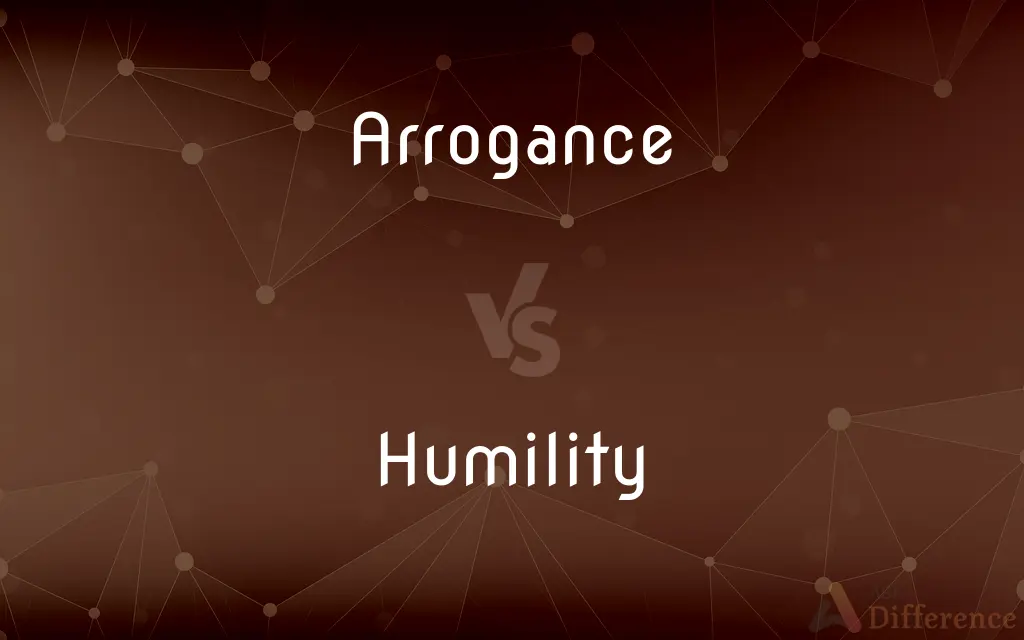Arrogance vs. Humility — What's the Difference?
By Fiza Rafique & Maham Liaqat — Updated on April 27, 2024
Arrogance involves an inflated sense of one's importance or abilities, often manifesting as overconfidence; humility, in contrast, entails a modest view of one's own significance.

Difference Between Arrogance and Humility
Table of Contents
ADVERTISEMENT
Key Differences
Arrogance is characterized by an exaggerated self-perception, where individuals may view themselves as superior to others. In contrast, humility involves recognizing and accepting one’s limitations and flaws without assuming superiority. This difference in self-perception can influence interpersonal relationships and communication styles significantly.
Individuals displaying arrogance often project confidence that can border on aggression or dismissiveness toward others’ opinions or abilities. On the other hand, humility fosters openness and a willingness to learn from others, enhancing collaboration and mutual respect.
Arrogant behavior typically seeks to dominate conversations and decision-making processes, driven by the belief in one’s infallibility. Whereas, humility allows individuals to value contributions from others, often leading to more equitable and considered outcomes.
While arrogance may lead to temporary success or assertiveness in some professional or social situations, it can also result in isolation and conflict as others may find such attitudes off-putting. Conversely, humility is generally more appealing and can build long-lasting relationships and trust.
Arrogance can hinder personal growth as it involves a reluctance to acknowledge mistakes or to engage in self-reflection. Humility, however, promotes continual learning and personal development by acknowledging that there is always room for improvement.
ADVERTISEMENT
Comparison Chart
Self-perception
Inflated, often unrealistic view of self-worth
Accurate, acknowledges personal limits
Interaction style
Dominant, dismissive of others
Respectful, values others’ contributions
Learning attitude
Resistant to feedback, unyielding
Open to feedback, eager to improve
Relationship impact
Often creates conflict and resistance
Encourages cooperation and respect
Long-term effect
Can lead to isolation and conflict
Builds trust and deepens relationships
Compare with Definitions
Arrogance
Overbearing sense of one's superiority.
Her arrogance made her unpopular among her peers.
Humility
Modesty about one's achievements.
Despite his successes, he spoke with humility.
Arrogance
Excessive pride in oneself.
His arrogance was evident in the way he dismissed constructive criticism.
Humility
Recognition of one’s own limitations.
Her humility in acknowledging her lack of knowledge was refreshing.
Arrogance
Disdain for others' opinions.
His arrogance is apparent when he ignores everyone else's suggestions.
Humility
Openness to learn and grow.
His humility helps him learn from every situation.
Arrogance
Self-importance overshadowing humility.
He approached the meeting with arrogance, disregarding the team's experience.
Humility
Respectfulness towards others' viewpoints.
His humility is shown in how he respects differing opinions.
Arrogance
Unwarranted confidence in one's abilities.
Her arrogance led her to take risks that were not well-calculated.
Humility
Lack of pretense or self-importance.
She carried herself with humility, making no show of her wealth.
Arrogance
The quality of being arrogant
The arrogance of this man is astounding
Humility
Humility is the quality of being humble. Dictionary definitions accentuate humility as a low self-regard and sense of unworthiness.
Arrogance
The state or quality of being arrogant; overbearing pride.
Humility
The quality or condition of being humble.
Arrogance
The state of being arrogant; a type of extreme or foolish pride in which someone feels much superior to another.
Humility
The characteristic of being humble; humbleness in character and behavior.
Arrogance
The act or habit of arrogating, or making undue claims in an overbearing manner; that species of pride which consists in exorbitant claims of rank, dignity, estimation, or power, or which exalts the worth or importance of the person to an undue degree; proud contempt of others; lordliness; haughtiness; self-assumption; presumption.
I hate not you for her proud arrogance.
Humility
The state or quality of being humble; freedom from pride and arrogance; lowliness of mind; a modest estimate of one's own worth; a sense of one's own unworthiness through imperfection and sinfulness; self-abasement; humbleness.
Serving the Lord with all humility of mind.
Arrogance
Overbearing pride evidenced by a superior manner toward inferiors
Humility
An act of submission or courtesy.
With these humilities they satisfied the young king.
Humility
A disposition to be humble; a lack of false pride;
Not everyone regards humility as a virtue
Humility
A humble feeling;
He was filled with humility at the sight of the Pope
Common Curiosities
How does humility affect leadership?
Humility in leadership fosters better teamwork, trust, and respect, enhancing overall effectiveness.
Is it possible for someone to display both arrogance and humility?
While they are opposite traits, a person might exhibit arrogance in some areas and humility in others.
How can one develop humility?
Practicing self-reflection, acknowledging limitations, and valuing others' input can help develop humility.
Can arrogance ever be positive?
While confidence can be positive, arrogance, by definition involving undue confidence, is generally viewed negatively.
How do arrogance and humility impact relationships?
Arrogance can strain relationships through conflict, while humility tends to strengthen interpersonal connections.
What are the professional risks of arrogance?
Arrogance can lead to poor decision-making, resistance from colleagues, and ultimately career setbacks.
What is the fundamental difference between arrogance and humility?
Arrogance involves an inflated view of oneself, whereas humility involves a realistic and modest view.
Are there cultural differences in how arrogance and humility are perceived?
Yes, cultural backgrounds can influence the perception and value placed on arrogance and humility.
How can teachers encourage humility in students?
By rewarding teamwork, reflection, and the acceptance of mistakes as learning opportunities.
Can humility be mistaken for weakness?
Sometimes, but typically it is recognized as a strength, especially in leadership.
How does humility enhance problem-solving?
It allows for considering multiple perspectives and more collaborative approaches to problem-solving.
Share Your Discovery

Previous Comparison
Abstain vs. Sustain
Next Comparison
Lagoon vs. LakeAuthor Spotlight
Written by
Fiza RafiqueFiza Rafique is a skilled content writer at AskDifference.com, where she meticulously refines and enhances written pieces. Drawing from her vast editorial expertise, Fiza ensures clarity, accuracy, and precision in every article. Passionate about language, she continually seeks to elevate the quality of content for readers worldwide.
Co-written by
Maham Liaqat















































